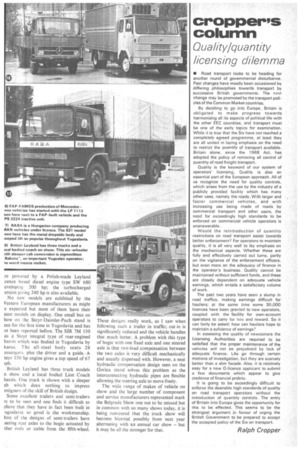cropper's column
Page 43

If you've noticed an error in this article please click here to report it so we can fix it.
Qualitylquantity licensing dilemma
• Road transport looks to be heading for another round of governmental disturbance. Past changes have mostly been occasioned by differing philosophies towards transport by successive British governments. The next change may be promoted by the transport policies of the Common Market countries,
By deciding to go into Europe, Britain is obligated to make progress towards harmonizing all its aspects of political life with the other EEC countries, and transport must be one of the early topics for examination. While it is true that the Six have not reached a completely agreed programme, at least they are all united in laying emphasis on the need to restrict the quantity of transport available. Britain alone, since the 1968 Act, has adopted the policy of removing all control of quantity of road freight transport.
Quality is the keyword of our system of operators' licensing. Quality, is also an essential part of the European approach. All of us recognize the need for quality controls, which arises from the use by the industry of a publicly provided facility which has many other uses, namely the roads. With larger and faster commercial vehicles, and with increasing use being made of roads by commercial transport and other users, the need for exceedingly high standards to be enforced on commercial vehicle operators is unanswerable.
Would the reintroduction of quantity restrictions on road transport assist towards better enforcement? For operators to maintain quality, it is all very well to lay emphasis on the mechanical aspects. Whether these are fully and effectively carried out turns, partly on the vigilance of the enforcement officers, but even more on the adequacy of finance in the operator's business. Quality cannot be maintained without sufficient funds, and these are closely dependent on adequate vehicle earnings, which entails a satisfactory volume of work.
The past two years have seen a slump in road traffics, making earnings difficult for hauliers; at the same time some 30,000 licences have been granted to new operators, coupled with the facility for own-account operators to carry for hire and reward. So it can fairly be .asked: how can hauliers hope to maintain a sufciency of earnings?
In assessing the quality of newcomers the Licensing Authorities are required to be satisfied that the proper maintenance of the vehicles will not be prejudiced by lack of adequatefinance. LAs go through certain motions of investigation, but they are scarcely better thah.a slim facade. Also, it is relatively easy for a new 0-licence applicant to submit a few documents which appear to give credence of financial probity.
It is going to be exceedingly difficult to enforce the desirable high standards of quality on road transport operators without the introduction of quantity controls. The entry of Britain into Europe gives the opportunity for this to beeffected. This seems to be the strongest argument j..n favour of urging the British Government to be prepared to accept the accepted policy of the Six on transport.
Ralph Cropper












































































































